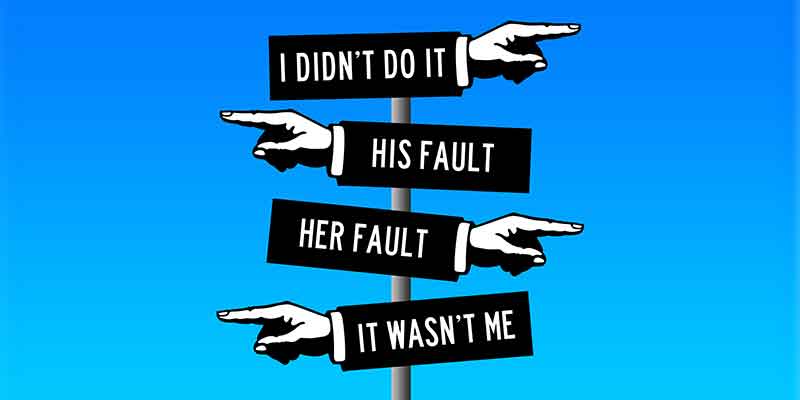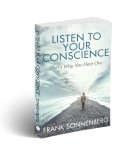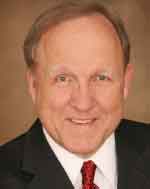To My Readers: I’m honored to republish, with permission, an article by Rodger Dean Duncan that first appeared in Forbes January 26, 2021. In it, he interviewed me about personal accountability.
— Frank Sonnenberg
In a World of Bad Behavior, A Call for Personal Accountability
By Rodger Dean Duncan PhD with Frank Sonnenberg
When I was a boy of about five, I loved thumbing through my grandmother’s nature books.
One day I came across a full-color photo of a butterfly emerging from its cocoon. I was fascinated by the image, and my grandmother gave me a brief tutorial on metamorphosis. It was the biggest word I’d ever heard.
Later that day I was introduced to another big word: conscience.
When my grandmother left the room, I carefully and quietly tore the photo out of the book.
Something inside my five-year-old brain and heart told me I was being naughty. Who knows? Maybe I rationalized that because I tore the page out quietly it wasn’t really a big deal. Or maybe I reasoned that because it was just a single page out of hundreds, nobody would ever notice and I wouldn’t get busted.
But I did. Get busted, that is.
Later that same afternoon, my grandmother confronted me with my crime. (What is it about grandmothers? Do they have some kind of special radar?)
Let’s just say my grandmother and I had a conversation. I distinctly recall two things about that talk. First, my grandmother said she wasn’t angry with me, but she was very disappointed. Ouch! Then she taught me about conscience.
I confessed that I knew violating one of her books was wrong. I probably even offered a couple of lame excuses. But as my grandmother explained that wonderful thing called conscience, I came to understand that I don’t have to fly solo when making choices and reaching decisions.
Then she delivered a seven-word lesson that has served me well in all the decades since: “A clear conscience is a good pillow.”
Today, some people seem to regard the notion of “conscience” as old-fashioned. Daily headlines are crowded with examples of hypocrisy, selective obedience, victimhood, projected blame, and a general lack of self-awareness. It raises concerns about how this modeling will affect upcoming generations.
One clarion call for integrity-based behavior is Frank Sonnenberg, author of Listen to Your Conscience: That’s Why You Have One.
Frank is a widely known advocate for moral character and personal responsibility and has been named “One of American’s Top Thought Leaders.” The appetite for his encouraging message is obviously large: his blog reaches nearly four million readers and his numerous books are bestsellers. He has served on several boards and consulted to some of the world’s largest and most respected companies.
I read about 120 books each year and consume a daily dose of news feeds, blogs, podcasts and other sources of information and ideas. I’m grateful that I can always return to Frank for a refreshing and reliable serving of the really good stuff. He’s a profound thinker who brings insightful perspective to life’s most important issues.
Rodger Dean Duncan: In a world beset with so much cynicism and intolerance, you focus on timeless principles like patience, kindness, and personal responsibility. There’s clearly an appetite for such positive things. So why does the “negative” still capture so much mindshare in our society?
Frank Sonnenberg: The human brain is hard-wired to gravitate toward negative stimuli and even dwell on gloomy information. This bias is the result of evolution in which we were forced to pay attention to threats and dangers for our survival. Unfortunately, there are a lot of people and groups who exploit this phenomenon for personal and financial gain. Social media is also a gathering place for negativity; some people say things on social media that they would never say in person.
I want to be a force for good — to help people do their best and be their best. I want my message to be positive, constructive, and inspiring. The fact is, your mindset matters more than you think. A positive mental attitude can improve your health, enhance your relationships, increase your chances of success, and add years to your life. In addition, a positive outlook is critical to performance. For example, if you believe you’re going to be successful, you’re going to view your prospects differently than if you think, “People like me never stand a chance.” If you believe you can’t, you won’t.
Duncan: What effect, if any, do you think the Covid pandemic has had on the popularity of your blog?
Sonnenberg: The Covid pandemic has turned our lives upside down. Besides the illness that it causes, it has prompted us to open our eyes and appreciate the important things in life. Many folks have taken such things as freedom, unrestricted travel, and sharing special moments with family for granted. I hope we never underestimate those treasures again.
In addition, self-reflection has driven people to search for purpose and define what’s important in life. Do you place more value on relationships or things? Do you define good or let others define it for you? What criteria do you use to determine happiness? Would you choose to be friends with yourself? Do you spend more time thinking ahead or reliving the past? How do you want to be remembered? I hope my writing helps people navigate their quest for meaning. As I say, “Everyone was put on this earth for a reason … what’s yours?”
Duncan: You advise people to pull out the weeds or make peace with the dandelions. What do you mean by that?
Sonnenberg: Most things in life are the result of choices that we make. You can live a healthy lifestyle or be a couch potato. You can invest in your future or spend money like a drunken sailor. You can listen to your conscience or fall victim to temptation. The point is, you have freedom to choose, but you’re not free from the consequences of those choices.
So take the bull by the horns and own your life. Set your course, make the difficult choices, and determine what you’re willing to sacrifice to achieve your goals. There’s no easy road to success. It takes hard work, commitment, and unyielding determination — don’t let people convince you otherwise. That said, if you’re not willing to make the commitment, don’t complain about the outcome.
Life doesn’t happen to you; it’s created by you. Either make things happen or learn to live with the fallout. As I say, “Choices are easy. The tough part is living with them.”
Duncan: Excellence is generally regarded as something worth seeking. Perfectionism, though, has its drawbacks. In fact, you say that a perfectionist’s work is never done. Please elaborate.
Sonnenberg: If you’re a perfectionist, you strive for perfection in everything you do. But therein lies the rub. It doesn’t matter whether the task is large or small, essential or trivial, urgent or routine, you go to the ends of the earth to achieve perfection. Is it worth it? If you overwhelm yourself with information in search of the perfect answer, you may become indecisive; if you spend too much time diving into details, you may end up missing the big picture; if you start things but never finish them, you accomplish nothing.
If you’re a perfectionist, you probably make everything into a competition — always pushing —never satisfied. What’s the incremental benefit of choosing perfection over excellence? Moreover, what do you lose in the process? Hold yourself up to a high standard, not an impossible one. Are you uncomfortable saying, “I’m finished” because an activity can always be improved? Do you search forever when making a minor purchase? Do you delegate responsibility and then micromanage because you can’t let go? As I say, “If you believe that excellence isn’t good enough, you may wake up one day and realize that your quest for perfection was anything but perfect.”
Duncan: At a time when information is more readily available than at any time in history, you offer this observation, “The only difference between being uninformed and being misinformed is that one is your choice and the other is theirs.” What do you see as best practices in identifying — and eliminating — blind spots?
Sonnenberg: You are bombarded with information every day. You search the Internet, obtain advice from family and friends, read product reviews, and hear the news on TV and via social media. While the information is plentiful and easily accessible, some of the information is completely inaccurate. The key is to scrutinize the information that you receive and harness it to your advantage — evaluating it for accuracy, honesty, objectivity, timeliness, and thoroughness.
Do you: Get information secondhand or from its original source? Accept everything at face value or view it with a healthy dose of skepticism? Believe something’s true because it’s well-presented or based on its merit? Determine whether the message is one-sided or presents both sides of the issue? Determine whether the information is opinion or fact? Accept the information blindly or ask how the conclusion was drawn?
Most people pay a lot of attention to the food they put into their body. If you’re that careful about the food you consume, shouldn’t you be equally prudent about how you feed your mind? Your thoughts, opinions, and beliefs hang in the balance.
Duncan: Some say we live in a world where “everybody gets a trophy.” You say that “people stop trying when there’s no benefit for being exceptional and no consequence for being mediocre.” How does that apply to performance cultures in business organizations?
Sonnenberg: Every organization needs the best and brightest people to join its team. Why would anyone penalize these shining stars? The sad fact is that we do it every day. When rewards are based on popularity, bias, or cronyism rather than on moral character and tangible performance, it sends a terrible signal to those who work hard and achieve results.
When you fail to recognize and reward exceptional performance, you raise the obvious question, “Why should I care if they don’t?” The next time you see an organization drowning in mediocrity, where no one cares, ask yourself, “Is apathy their fault or is it the organization’s failing?”
We don’t gain anything from lowering the bar so that everyone can clear it. We also don’t gain anything by robbing people of the rewards that they richly deserve. It’s time to demand excellence, and to recognize and reward it, too.
Duncan: Entrepreneurship is more popular than ever. Your advice is that “personal branding is less a marketing exercise than it is becoming the best person you can be.” What does that look like in observable behavior?
Sonnenberg: When people use the term personal branding, the first thing that comes to mind is how to package yourself. They view it as a PR or marketing exercise. I believe you can’t develop a first-rate reputation based on smoke and mirrors.
Your brand is a reflection of who you are and how you choose to live your life. Forget your to-do list and create a to-be list.
Be the person others look up to — whose character is beyond reproach. Be the one who inspires others to achieve excellence. And be the one who lives with decency and grace.
Some of the most precious things you possess are your honor, your dignity, and your reputation. At the end of the day, if you’re not proud of who you are and the way you choose to live your life, little else matters.
This article first appeared in Forbes. It is republished, with permission. (© 2021 Rodger Dean Duncan. All rights reserved.)
Rodger Dean Duncan is the bestselling author of LeaderSHOP: Workplace, Career, and Life Advice From Today’s Top Thought Leaders.
About Rodger Dean Duncan
For the past 40 years I’ve consulted and coached leaders from the factory floor to the boardroom in some of the world’s best companies in multiple industries. Basically, I help people get good stuff done while avoiding the Dilbert Zone. Early in my career I covered politics and business for Texas newspapers, and freelanced for publications ranging from The New York Times and The National Observer to Boys’ Life and Parade magazine. Then I was a university professor, worked on Wall Street, served in two White House administrations, advised several U.S. Senators, and headed worldwide communications at Campbell Soup Company. My Ph.D. (Purdue University) is in organizational behavior, but my orientation is the real world of real work. My bestselling book is CHANGE-friendly LEADERSHIP: How to Transform Good Intentions into Great Performance. Follow on Twitter @DoctorDuncan
Please leave a comment and tell us what you think or share it with someone who can benefit from the information.
Additional Reading:
Moral Character Matters
Take Ownership by Taking Responsibility
Living Life With a Purpose
Great Things Start with Great Expectations
Living the Golden Rule
What Does It Take to Show a Little Kindness?
The Consequences of No Consequences
If you like this article, subscribe to our blog so that you don’t miss a single post. Get future posts by RSS feed, email or Facebook. It’s FREE.








Leave a Comment